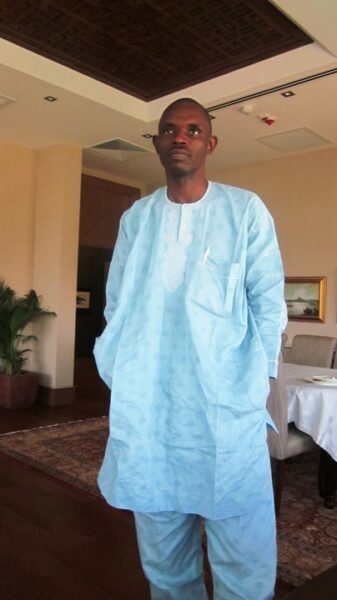By Toyin Falola
A group of mice lived in constant fear of a marauding cat. They knew they could never know peace or attain any level of development as long as the cat roamed their environment. Recognizing the imminent destruction that awaited them, they understood that without some cautionary measure or something more definitive, they would remain helpless and unfortunate in a kingdom overseen by the fierce cat. After thorough deliberations, they decided to hang a bell around the cat’s neck so that whenever it moved, the bells would jingle and announce the presence of their mortal enemy.

But then, hanging a bell around the neck of a marauding cat is not a simple task; it is, in fact, an act of “seppuku,” the Japanese term for ritualistic suicide. The group of mice knew they had a problem, but recognizing a problem and devising the appropriate solution are two different things. Inasmuch as the mice were smart enough to come up with a solution, they also needed the courage to execute it. This reflects the nature of existence and evolution. In fact, the mice’s dilemma gave rise to the ancient expression, “Who will bell the cat?”
The above analogy describes Nigerians and, by extension, Africans and the challenges they face. Like the mice, Nigerians understand that the arrival of any politician signals imminent problems. The good thing is that they did not come to this conclusion through hasty generalizations but from decades of experiences under the same political stalwarts. They know that, like the mice, they are vulnerable to politicians who have the power to destroy them, distract them while in packs, and target the most suitable victims, thereby forcing the lucky ones to seek immediate safety.
Let us think about it. Humans, like the mice, are always petrified by the thought of losing their lives, even if their existence does not bring fulfilment. People sustain their existence with hope, a commodity that encourages them to wake up daily with the expectation that things will get better. Why would Nigerians not label their leaders as the greatest threat to the citizens when every politician wants to live lavishly without doing anything tangible or fulfilling? Rather, these leaders use their superior powers to prey on the vulnerable.
In essence, Nigerians have decided that the best way to conquer the enemy–the politicians– is to hang a bell on their necks. The solution appears great, but the execution is the problem. And this is where Olagunju comes in. He is one of the courageous individuals who stepped forward to bell the cat of these perpetually unyielding politicians. Of course, he understands that the act of calling them out is particularly dangerous, especially knowing that they wield so much power that they often escape public scrutiny.

I recall a clear occasion when this fearless man made a poignant statement about the directionlessness of a head of state. His pen remains sharp, and whenever ink flows from it, it strikes at the heart of politicians. They understand that his message is equivalent to belling the cat, warning the vulnerable populace of the danger lurking in space due to the unsavoury policies put in place by the political class. It is clear to the masses that the Nigerian political class is ruthless, particularly when pursuing dreams that favour their provincial objectives.
For instance, wardrobe allowances, fuel allowances, and travel allowances for individuals who already earn high incomes and are doing very well, compared to politicians in greater climes, all indicate that the Nigerian politician is like the cat. He is the marauding cat! In one way or another, they will always be dangerous to the aspirations of the common people. It stands to reason, therefore, that the misappropriation of public funds, even when the challenges are known, shows that they always want to take advantage of others. They can kill and skin!
No one reads Olagunju’s columns (“Monday Lines”) without seeing how courageous this sage is in addressing problems that have proven intractable to humanity. He initiated a mind-opening conversation on the issue of minimum wage, which has become a protracted matter of debate between the government and helpless workers. Away from the superficial argument that workers need an increase in their wages, Olagunju sparked a conversation about the failure of the political class to recognize the greatest irony of their own making. He implied that the senators, other lawmakers, executives, and their members have conscientiously forgotten that, by the nature of their services, they are also labourers and deserve to be treated as such.
If politicians are indeed labourers, then a senator who is used to an entourage of praise singers– a breed of sycophants whose stock-in-trade is to adulate politicians for pecuniary gains–would find it immeasurably difficult to sustain a lavish lifestyle. They know that subjecting them to critical evaluation and controlled treatment as regular labourers will strip them of their legitimacy and turn them into objects of ridicule anywhere they find themselves. As such, they are not particularly interested in regulating the wages of labour; they are only invested in the pauperization of the masses so that they can continue to live largely and enjoy unending inequity. This is the society the political class wants. They understand that without maintaining such a structure, it will be difficult to have unrestricted and unalloyed access to the commonwealth.
Meanwhile, the entire labour force understands this problem, and they are aware that their lives have been programmed in a way that makes it mortally difficult for them to realize their potential. By virtue of controlled labour wages, each worker’s life is planned for by the state, and the plan is far from pleasant. For the average workers, unless they resort to dubious and unconventional means, cannot attain financial freedom in their lifetime. They cannot accumulate assets like the political class does. While we can argue that such a poverty mindset does not gain popularity among workers because they understand the broader implications, they still deserve a moderate lifestyle with access to what they need and want. However, the political class has shortchanged this arrangement, making it difficult for them to enjoy such luxuries. With meagre salaries, it is a wild dream for ordinary people to stand up to their oppressors and demand access to a better life.
The system has been skewed for a very long time, functioning against the wills and aspirations of the common people. This prompts me to ask, in the fashion of that noble academic Gayatri Spivak, “Can the subaltern speak?” The political class knows this and has continually weaponized it, which explains why many people become jittery at the mere thought of ordinary citizens questioning the political class. They understand the risks involved and are aware of the potential consequences of such an action.

I have held Olagunju in high esteem for obvious reasons. For one, his determination to call out politicians to order, irrespective of their heightened political worth, has always won the hearts of people like me because, in such a challenging terrain of discourse, only the determined survive. Nigeria is notorious for clamping down on individuals confident enough to speak their minds against the power blocs responsible for their continued deprivation. The psychology of the masses has been so damaged that it is difficult for them to recognize who is truly doing them a favour. Sometimes, they make an enemy of anyone confident enough to stand up for themselves or fight on behalf of the majority.
Remarkably, Olagunju has never been deterred by this. Like the proverbial mouse who has to bell the cat, he understands that his continued calling out of the political class is a form of ritual sacrifice–not one that will threaten his life, but one that can even deny him the affection of the people for whom he fights. He remains unshaken in how he carves his messages, having seen enough to understand that this trajectory he has chosen needs a significant amount of determination. Olagunju’s consistency has won him the respect of individuals like me and others because when you see someone dedicated to a cause, their actions, and not just what they say, speak volumes.
PS: This is Part 3 of a Six-Part Series. I wish to express my gratitude to my Tanzanian-based host.

The issues raised in Olagunju Lines are issues at heart of African politics. Here in East Africa, the scenario is not any different. Academics have a role to use the Olagunju-like pen to expose the political structures that continue to protect the corrupt and extend inequality in society.
The way Lasisi Olagunju weaves his presentations with Yoruba folktales, history and past events and literature has become a distinct style. This style makes the masses to better understand the scenario he’s describing or portraying. Kudos to him !
Your article demonstrates considerable promise, showcasing insightful ideas and a solid foundation. To elevate it to a truly outstanding level, consider the following enhancements: 1. Deepen your analysis by exploring key concepts more thoroughly, providing nuanced explanations, and addressing potential counterarguments. 2. Strengthen your arguments with additional evidence, including peer-reviewed sources, relevant statistics, and illustrative case studies. 3. Refine your writing style to engage advanced readers. Vary sentence structures, employ more sophisticated vocabulary, and ensure each paragraph flows seamlessly into the next. 4. Enhance the overall narrative arc. Craft a more compelling introduction that clearly outlines your thesis and a conclusion that reinforces your key points while highlighting broader implications. 5. Incorporate a more critical examination of alternative viewpoints to demonstrate a comprehensive understanding of the topic and pre-emptively address potential critiques. 6. Elaborate on the practical implications and real-world applications of your arguments. This will increase the relevance and impact of your work. 7. Draw connections to related fields or concepts, broadening the scope and appeal of your article while showcasing its interdisciplinary significance. 8. Consider incorporating more vivid examples or analogies to illustrate complex ideas, making your work more accessible without sacrificing depth. 9. If appropriate, include visual elements such as graphs, charts, or infographics to support your textual arguments and appeal to visual learners. 10. Ensure your conclusion not only summarizes your main points but also opens up avenues for further research or discussion, encouraging ongoing engagement with your ideas. Your innovative approach and clear writing provide an excellent foundation. By implementing these suggestions, you can transform your already solid work into an exceptional piece that resonates deeply with a professional audience and makes a significant contribution to your field. The potential for greatness in your work is evident. Your commitment to excellence shines through, and I’m confident that your continued efforts and refinements will yield truly impressive results. I eagerly anticipate seeing how you build upon these strengths in your future endeavors, further establishing yourself as a thought leader in your area of expertise.